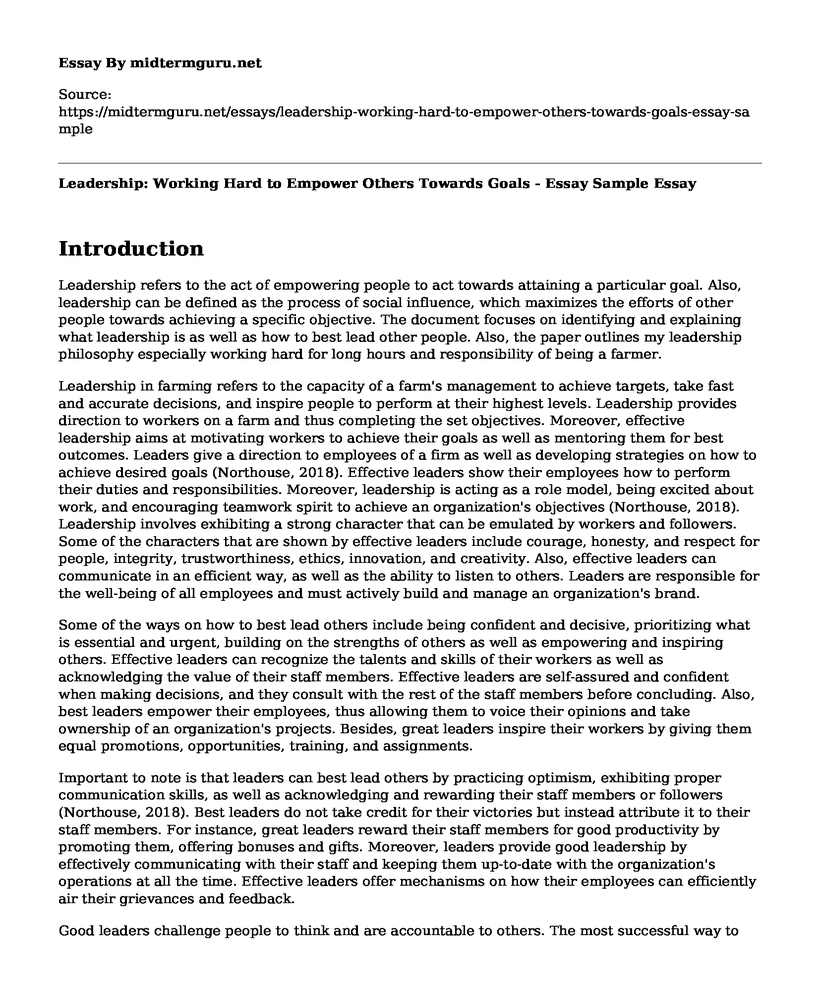Introduction
Leadership refers to the act of empowering people to act towards attaining a particular goal. Also, leadership can be defined as the process of social influence, which maximizes the efforts of other people towards achieving a specific objective. The document focuses on identifying and explaining what leadership is as well as how to best lead other people. Also, the paper outlines my leadership philosophy especially working hard for long hours and responsibility of being a farmer.
Leadership in farming refers to the capacity of a farm's management to achieve targets, take fast and accurate decisions, and inspire people to perform at their highest levels. Leadership provides direction to workers on a farm and thus completing the set objectives. Moreover, effective leadership aims at motivating workers to achieve their goals as well as mentoring them for best outcomes. Leaders give a direction to employees of a firm as well as developing strategies on how to achieve desired goals (Northouse, 2018). Effective leaders show their employees how to perform their duties and responsibilities. Moreover, leadership is acting as a role model, being excited about work, and encouraging teamwork spirit to achieve an organization's objectives (Northouse, 2018). Leadership involves exhibiting a strong character that can be emulated by workers and followers. Some of the characters that are shown by effective leaders include courage, honesty, and respect for people, integrity, trustworthiness, ethics, innovation, and creativity. Also, effective leaders can communicate in an efficient way, as well as the ability to listen to others. Leaders are responsible for the well-being of all employees and must actively build and manage an organization's brand.
Some of the ways on how to best lead others include being confident and decisive, prioritizing what is essential and urgent, building on the strengths of others as well as empowering and inspiring others. Effective leaders can recognize the talents and skills of their workers as well as acknowledging the value of their staff members. Effective leaders are self-assured and confident when making decisions, and they consult with the rest of the staff members before concluding. Also, best leaders empower their employees, thus allowing them to voice their opinions and take ownership of an organization's projects. Besides, great leaders inspire their workers by giving them equal promotions, opportunities, training, and assignments.
Important to note is that leaders can best lead others by practicing optimism, exhibiting proper communication skills, as well as acknowledging and rewarding their staff members or followers (Northouse, 2018). Best leaders do not take credit for their victories but instead attribute it to their staff members. For instance, great leaders reward their staff members for good productivity by promoting them, offering bonuses and gifts. Moreover, leaders provide good leadership by effectively communicating with their staff and keeping them up-to-date with the organization's operations at all the time. Effective leaders offer mechanisms on how their employees can efficiently air their grievances and feedback.
Good leaders challenge people to think and are accountable to others. The most successful way to lead others is by challenging them to be creative and innovative. Leaders understand the mindset of their colleagues and followers and identify capabilities and areas of improvement (Northouse, 2018). Best leaders use their knowledge and expertise to challenge their staff members to think and stretch them to achieve more. Also, successful leaders become accountable to their staff members and ensuring that they remain proactive in their actions. Another way of effectively leading people is through properly allocating and deploying talent. Efficient leaders know how to identify skills within their workforce and how to use it. Moreover, best leaders have the capability of activating the potential of their staff members and knowing when to deploy their unique skill at a particular circumstance.
Effective leaders invest in mutually beneficial relationships, which are essential to both the employer and the employees (Northouse, 2018). For instance, effective leaders provide ways to bettering their relationship with their staff members. Moreover, great leaders lead by instilling hope to their employees by encouraging them to get out of their comfort zones and get to better and bigger responsibilities. Important to note is that good leaders lead by supporting new ideas and creating a healthy competition. Good leaders motivate their staff members by encouraging new ideas and understand that implementing innovations from their juniors gives them a sense of ownership and pride. Besides, they show genuine concerns about the challenges affecting their staff members and set reasonable expectations. Good leadership encourages high levels of integrity and responsibility. Efficient leaders are knowledgeable on how to give individuals room to grow and build confidence so they can develop into more exceptional leaders as well.
Conclusion
Conclusively, I would best lead others by setting an excellent example to my workers, setting reasonable expectations to them and leading with honesty and integrity. I would also lead efficiently by rewarding my employees with more than money and providing feedback mechanisms within the workforce.
References
Northouse, P. G. (2018). Leadership: Theory and practice. Sage publications. Retrieved from https://scholar.google.com/scholar?hl=en&as_sdt=0%2C5&q=Leadership&btnG=#d=gs_cit&u=%2Fscholar%3Fq%3Dinfo%3A0TQSV-HVYBcJ%3Ascholar.google.com%2F%26output%3Dcite%26scirp%3D8%26hl%3Den
Cite this page
Leadership: Working Hard to Empower Others Towards Goals - Essay Sample. (2023, Jan 25). Retrieved from https://midtermguru.com/essays/leadership-working-hard-to-empower-others-towards-goals-essay-sample
If you are the original author of this essay and no longer wish to have it published on the midtermguru.com website, please click below to request its removal:
- The Workflow in Service Delivery on the Example of Guestroom Cleaning
- Research Paper on Business Ethics
- Research Paper on Code of Conduct and Code of Value
- What Is Going On With DHS in Strategic Sourcing? - Essay Sample
- Cloud Computing: Unlocking Business Potential and Streamlining Operations - Research Paper
- Creating Effective Learning & Development Programs for Organizational Growth - Essay Sample
- Johnson & Johnson Crisis: Solutions and Implementation Plan - Essay Sample







